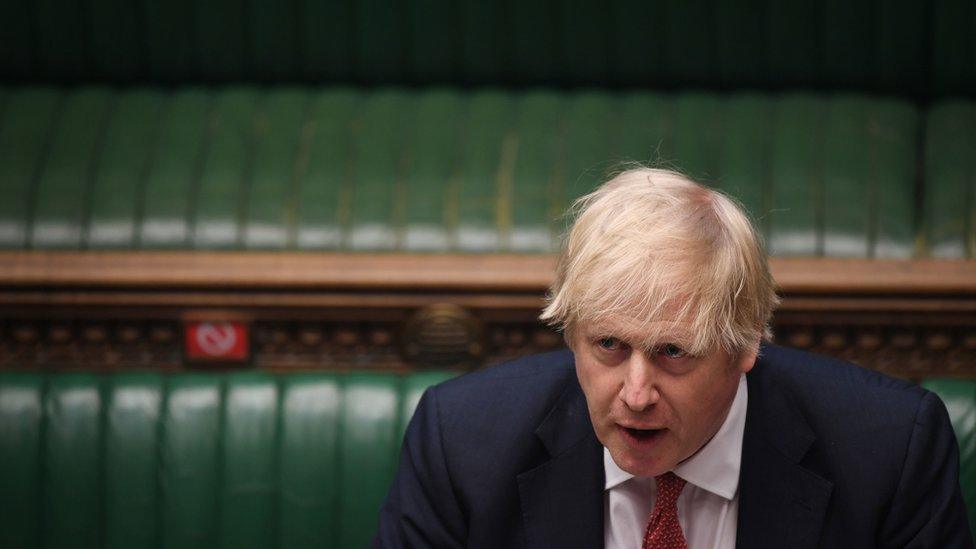Liaison Committee will challenge Boris Johnson's style
- Published

Boris Johnson at PMQs
Since Tony Blair first appeared before the Commons Liaison Committee back in July 2002, the bi-annual questioning of the PM by select committee chairs has tended to disappoint.
Quiet, civilised and focussed on detail, while PMQs is (or used to be, pre-COVID-19) shouty and confrontational, a media reared on the knockabout in the Commons chamber found the 90-minute sessions a let-down.
At first, the committee gave each of its 30 or so members (it varies a bit, depending on the configuration of the committee system in any given year) a pop at the PM.
I remember when, during an early encounter with Tony Blair, the PM was under just a little bit of pressure when his questioner's time ran out.
It was then the turn of Tory MP David Tredinnick - then-chair of one of the internal committees - to switch the subject to his pet cause, homeopathy.
The Blair eyes rolled and all tension evaporated.
Gradually over time, the questioning became more focussed.
As it became clear that giving those 30 MPs a complete free for all made the whole exercise pretty ineffectual, the committee began to announce areas of questioning in advance, and limited the number of questioners, so not everybody got their chance in a particular session.
Potential critics
This is the backstory to the decision to focus today's questioning in a manner that excludes the chairs of the defence and foreign affairs committees, Tobias Ellwood and Tom Tugendhat - both independent-minded Conservatives, who might perhaps have taken a critical line.
But, with today's session focussing on the government response to the pandemic, and the conduct of Downing Street guru Dominic Cummings, there are still quite a number of serious potential critics.
Notably there is the PM's leadership rival and long-serving former Health Secretary Jeremy Hunt and the former Business Secretary Greg Clark, whose Science and Technology Committee has been asking some awkward questions.
Then there's Simon Hoare from the Northern Ireland Committee who has called for Mr Cummings to consider his position.
And that's before we get to the Labour members.
Yvette Cooper has established herself as a formidable interrogator at home affairs, and the quietly effective Meg Hillier from public accounts has an eye for detail, as well as an encyclopaedic knowledge of the workings of Whitehall.
The best prospect for pyrotechnics is probably the SNP's Pete Wishart, who will doubtless have devised some barb to goad the PM into a reaction.
Close scrutiny
Presiding over today's session is the newly-installed chair of the committee, Sir Bernard Jenkin.
The government voted him into that office to keep out more troublesome alternatives, and the format excluding Messrs Tugendhat and Ellwood has already raised eyebrows.
So, his conduct of the session will be under close scrutiny from the start, and he will know it.
And what of the PM? For 18 years, his predecessors have found the Liaison Committee a fairly easy gig to play.
The questioning comes from many angles, but from allies as well as opponents, and it is seldom well co-ordinated.
But it is also a forum where Boris Johnson's normal style may not play well - a snippet of Latin or a grammatical flourish may get the troops behind him at PMQs, but it will not play well with senior MPs with high opinions of themselves, asking serious questions.
As Mayor of London, the PM sometimes found himself snarling at members of the Greater London Assembly when he came before them, in a rather similar format.
But he can't afford that self indulgence in this forum, in this moment.
